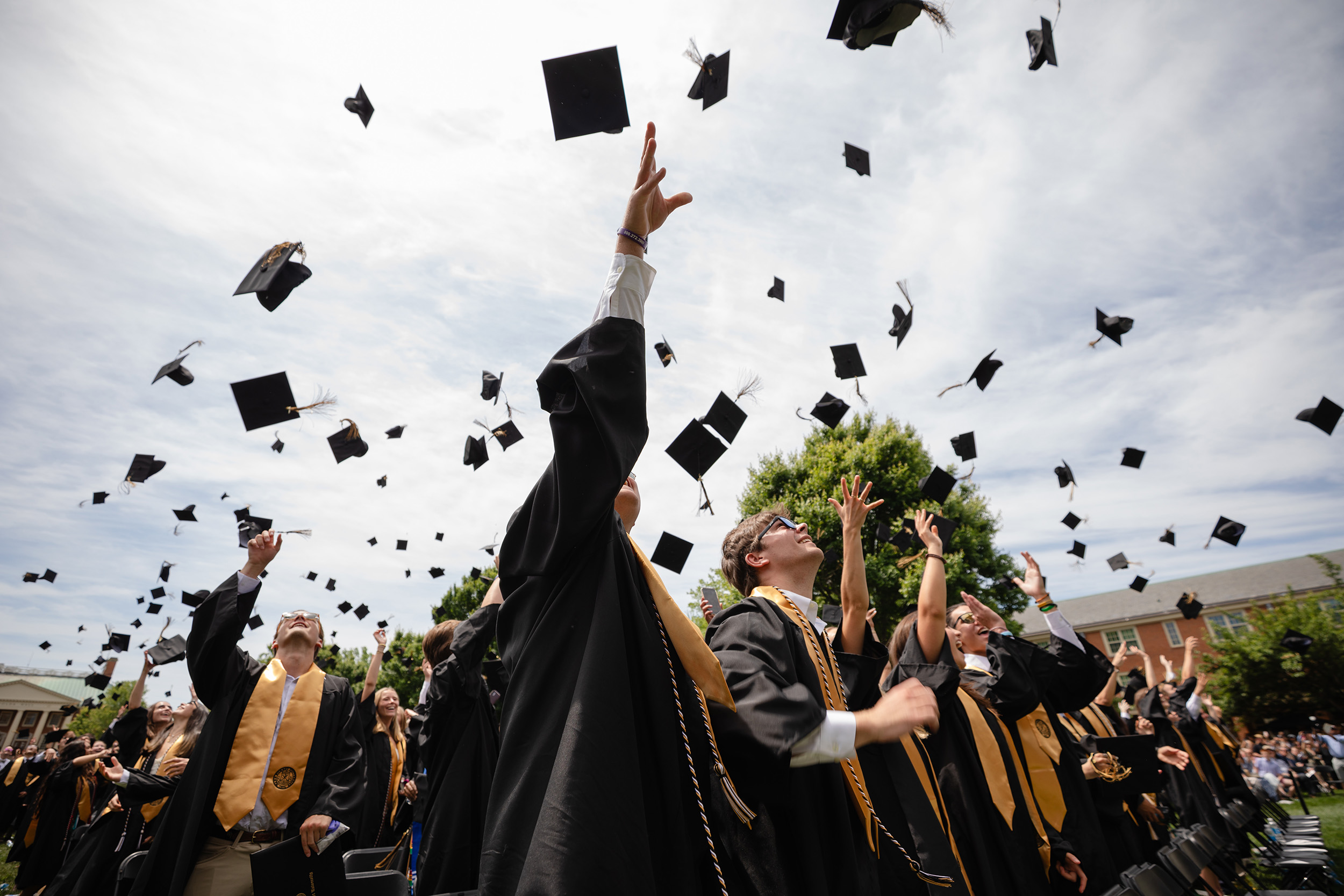Inspiring the next generation of STEM scientists
Wake Forest program gives high schoolers a LEAP forward
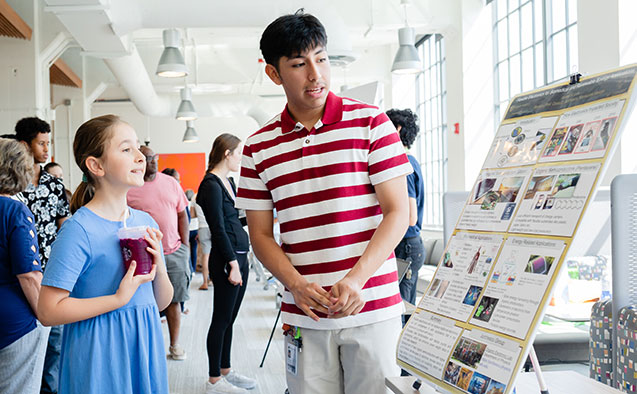
When Deloris Baah, a rising junior at North Forsyth High School, began the Wake Forest LEAP program six weeks ago, she had no idea what a fluorescent carbon dot was or what it could do.
Now, she knows how to make them in the lab using food waste and understands how using these nanomaterials can help promote sustainability.
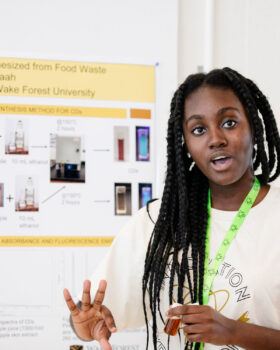
Deloris Baah explains how nanomaterials can help promote sustainability.
“I used pineapple skin and organic pineapple juice for my experiments,” Baah said. “Look how it gives us a different color emission, so the pineapple extract had the higher light emission.”
She was one of 19 high school students who shared research project results during the final symposium held at the University’s Wake Downtown July 28. LEAP is a summer, paid, lab-based internship program for rising high school juniors and seniors who attend one of six Title I Winston-Salem/Forsyth County Schools: Carver, Glenn, Kennedy, North Forsyth, Parkland IB, or Reynolds. Title I schools are identified by the federal government because they serve a large population of families facing economic challenges.
Bridging the opportunity gap
The LEAP program gives students the chance to conduct hands-on, lab research. Each student is paired with a Wake Forest faculty member and a co-mentor, either a Wake undergraduate or graduate student. These mentors introduce them to the foundations of their discipline and to research.
The goal of the program is to increase the number of traditionally underrepresented minorities in the STEM education pipeline.
Kelsey Morgan, a second-year Ph.D. student in the chemistry department, co-mentored Baah during her research project. “This is my second year with the program,” Morgan said. “I want to be a professor after I finish my PhD.”
“This experience is helping me find my mentoring style and how to communicate effectively with younger students about complex science. ” Wake Forest PhD student Kelsey Morgan
During the symposium, Taalib-Din Khalil Grier II asked participants to squeeze a dynamometer as hard as they could. The device measures grip and hand strength. He then referred them to a chart with percentages to compare their results with others. His project, focused on muscular strength as an important component of overall physical fitness, helped him figure out what he would like to do after high school.
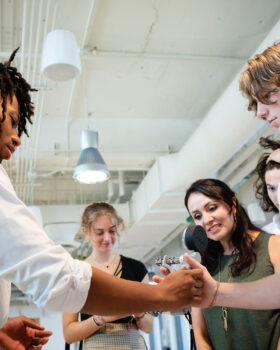
Taalib-Din Khalil Grier II asks participants to squeeze a dynamometer to measure grip and hand strength.
“l was ‘going with the flow’ and wasn’t even sure about going to college,” said Grier, a rising senior and athlete at Carver High School. “This experience has sparked my interest in STEM. Now, I want to go to college and study this and pursue a degree, maybe even become an exercise physiologist. I see how I can work with people to help them improve themselves physically and mentally and teach them how to work out safely.”
Health and exercise science professor Shannon Mihalko and Grier’s co-mentor said, “We really saw a lightbulb turn on when he got involved in the muscular strength aspect and how to measure it.”
Working together
Around the corner, the smell of pancakes was hard to miss. It led to a station where engineering professor Erin Henslee was making a short stack.
“The pancakes represent blood cells,” Henslee said. The perfect round shape is a healthy cell and the ones that look ‘bat wings’ are the unhealthy cells.”
This demonstration highlighted work from high schooler Isabelle Blancas, who conducted hands-on lab experiments using microscope techniques to see if red blood cells were moving toward the disease stage.
Henslee explained why she works with LEAP.
“As researchers, I think we have the responsibility to make our research accessible to the general public and also inspire that next generation of scientists,” she said. “Students being able to challenge themselves and reveal sides of themselves that they didn’t know they had and to be a mentor to help bring that out, whether it’s the public speaking or the math analysis that they didn’t think they could do, it’s such a privilege to be part of that.”
“I have learned so much through this opportunity. I see the importance of opening yourself up and not being afraid to ask questions.” Isabelle Blancas
Beyond the Laboratory
In addition to working in labs, LEAP students also take day trips to local sites, including Inmar, WFIRM and Forsyth Tech. Students tried out the flight simulator, explored an aircraft used for search and rescue by the Civil Air Patrol, and operated drones and robotic devices at Forsyth Tech’s Mazie S. Woodruff Aviation Technology Lab.
“We try to expose our interns to a number of different STEM disciplines, including areas they may not initially consider outside of traditional bench science,” said Alana James, director of Wake Downtown. “LEAP’s partnerships are incredibly strong and afford our interns a peek into spaces that many do not even know exist.”
The program also includes professional development workshops related to career exploration, resume development, networking, public speaking and research. These are conducted in partnership with Wake Forest’s Office of Personal and Career Development; ZSR Library, and the Wake Forest Speaking Center.
Overcoming the challenge
To encourage participation and reduce barriers, LEAP students receive a stipend of $1,800, which is designed to replace income from a summer job. Transportation and a meal plan are also included.
Paloma Castillo-Hernandez a rising senior at Carver High School, didn’t know how to code when she first started the program. By the end of it, she was writing her own computer code and learning how to run calculations on the Wake Forest supercomputer.
She said the experience has sparked her interest in pursuing a STEM career in physics.
““I thought ‘I don’t think I can do coding, it’s too difficult’,” said Castillo-Hernandez. “But then, I got the hang of it and thought maybe I can do it if I really put my mind to it and work hard on it, then I can achieve it and I did,” she said.
Making an impact
The three-year pilot began with 12 interns last summer. This year, 19 students are enrolled and next summer that number will grow to 24.
LEAP is made possible by support through the Burroughs Wellcome Fund Student STEM Enrichment Program (SSEP) and The Truist Foundation.
Early data from the first cohort shows success with learning outcomes, intention of pursuing STEM after this program and enthusiasm about school. Rebecca Alexander is a chemistry professor and associate dean for research and community engagement at Wake Forest. She said they hope to expand the program to serve more students at Title I high schools in the community.
“We are excited to keep working toward what’s possible in the future,” Alexander said. “We are especially excited to track these students from each cohort to keep in touch with them and follow their progress and outcomes to indicate their success and help us with finding other funding partners.”
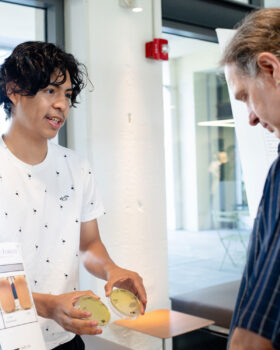
José Toscano talks with physics professor Dany Kim-Shapiro about his research.
After the six weeks in the summer, the experience and relationships built between the students and their mentors continue with Saturday meetings in the fall and spring.
All of this is important to 17-year-old José Toscano, a rising senior at Glenn High School. He was full of nervous energy as he talked in front of the large crowd that gathered in the lobby to hear each intern talk about their experience in the program. He said LEAP opened a door that he never thought was possible.
“I got very emotional at the podium because I will be the first generation to go to college,” Toscano said. “I’m the oldest in my family, and I want to be a role model for my siblings. Everyone was so helpful in this experience, and it has prepared me to build my future.”
Categories: Top Stories
Wake Forest News
336.758.5237
media@wfu.edu
Meet the News Team
Headlines
Wake Forest in the News
Wake Forest regularly appears in media outlets around the world.




